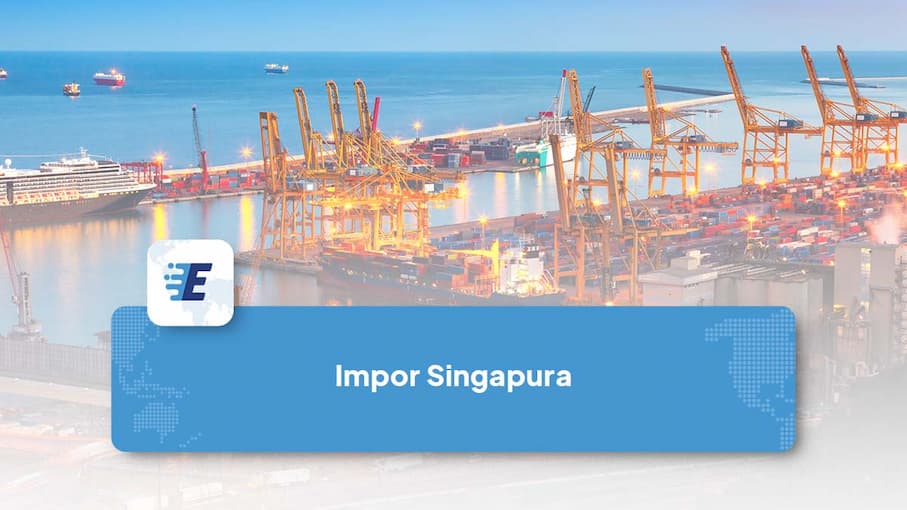Last updated on June 28th, 2024 at 03:20 pm
Singapore, often referred to as “The Little Red Dot” because of its strategic location in the heart of Southeast Asia. With its crucial position, this country has become the center of the world's busiest maritime traffic, connecting 600 ports in around 120 countries. This results in a diverse range of imported commodities entering Singapore, not just from its neighbors.
Singapore's advantage as a trade hub is supported by a highly competent workforce, secure infrastructure, and an open attitude towards migration. Trade and investment cooperation between Indonesia and Singapore continues to strengthen, including in terms of commodity exports.
Singapore actively imports various commodities that cannot be produced locally. This is due to natural resource limitations, but the country manages this by focusing on trade and industry. As a result, Singapore successfully imports a diverse range of commodities from around the world. So, what goods does Singapore import? Check out the complete information below!
What does Singapore import?
List of contents
Singapore imports various types of goods to meet consumer and industrial needs. Here are some of the goods imported by Singapore along with their explanations:
Natural Gas
Singapore lacks sufficient natural gas resources to meet its energy needs. Instead, the country imports natural gas from various producing countries such as Australia, Malaysia, and Indonesia. Natural gas is used in power generation, manufacturing industries, and as a raw material for petrochemical production.
Crude Oil
Singapore also lacks sufficient crude oil reserves and heavily relies on imported crude oil to meet its energy needs. Crude oil is imported in both raw and refined forms such as fuel oil, gasoline, diesel, and aviation fuel. The country imports oil from various oil-producing nations such as Saudi Arabia, Kuwait, and the United Arab Emirates.
Read Also: How much does it cost to live in Singapore? Here are the details!
Machines and Electrical Equipment
Singapore imports various types of machines and electrical equipment to support its rapidly growing industrial and manufacturing activities. These items include production machinery, processing equipment, electronic devices, electronic components, and household appliances. The country imports machines and electrical equipment from various manufacturing countries such as Japan, China, and the United States.
Food Ingredients
Singapore imports most of the food ingredients consumed by its population due to limited natural resources for agriculture. The country imports various types of food ingredients including rice, wheat, meat, fish, fruits, vegetables, dairy products, and processed food items. Singapore imports food ingredients from various producing countries such as Malaysia, Indonesia, Australia, and the United States.
Pharmaceutical Products
Singapore imports pharmaceutical products such as medications, health supplements, and medical devices to meet the healthcare and pharmaceutical needs of the country. These pharmaceutical products are imported from various manufacturing countries such as the United States, Europe, and Japan.
Gold
Singapore is one of the leading gold trading centers in the world and imports gold in the form of bars and jewelry for trading and investment purposes. The country also imports gold to support jewelry manufacturing and gold industry activities. Singapore imports gold from various gold-producing countries such as Switzerland, Australia, and the United States.
By importing these goods, Singapore can meet the energy, industrial, consumption, and investment needs that support economic growth and the welfare of its people.
Import Tariffs in Singapore
If you want to import goods into Singapore, you also need to consider the tariffs applicable to imported goods. The following are the types and tariffs of imports in Singapore:
Goods and Services Tax (GST)
All goods passing through Singapore customs must be subject to a Goods and Services Tax (GST) of 7% on the import value. This import tax applies to goods with a total value of SG$400 or more.
The calculation of the taxable value is based on Cost,, Insurance,and Freight (CIF), including duties and other taxes. GST is actually paid by the consumer but imposed by the seller of goods and services and remitted to the government.
Starting from January 1, 2023, the Singapore government also imposes GST on low-value goods purchased online. For goods not subject to customs duties, GST calculation is based on the CIF value, commission, and other charges even if not stated on the invoice.
Import Duties and Taxes on Imported Goods
Import duties and taxes are taxes imposed on goods exported with taxes or produced in Singapore. The calculation of duties and taxes is based on specific tariffs or ad valorem, which means import taxes are levied as a percentage of a certain amount per unit weight, total shipment value, or other relevant parameters.
The imposition of duties and taxes depends on the type of goods and is divided into four main categories: tobacco products, high-alcohol beverages, motor vehicles, and petroleum products or biodiesel blends.
Import Regulations in Singapore
In addition to considering tariffs, understanding Singapore's import regulations is crucial before starting trading activities. Here are some steps that can help you understand import requirements in the country:
- Registration with ACRA:: Before engaging in trading activities in Singapore, companies must first register with ACRA, the national business regulator in the country. Upon completion of the registration process, the company will be issued a Unique Entity Number (UEN), which serves as a standard identification for the company and other business entities.
- Import Process: Companies importing goods must determine whether GST payment is required for the imported products. Some things to consider include:
- When goods are in a Free Trade Zone (FTZ), import duties and/or GST may be suspended.
- If goods are directly used for local purposes, then import duties and/or GST must be paid.
- If goods are moved from FTZ to a licensed customs place, import duties and/or GST may be suspended while the goods are stored at the licensed place.
- Import duties and/or GST are not levied on types of goods eligible for GST relief or goods imported under Singapore Customs' Temporary Import Scheme.
- Registering as a Declaring Agent:: Companies must create a Customs Account to obtain import-export permits. If a company applies for permits on its own, they must also register as a declaring agent and set up an interbank GIRO with Singapore Customs for payment of duties or GST.
If a company uses a declaring agent, they need to coordinate with the agent in the permit application process. Singapore Customs will identify the agent as submitting the applications on behalf of the trading company.
Read Also: 7 Best Singaporean Personal Shopper Services Recommendations
- Goods Classification:: Every company needs to verify whether the goods to be imported fall under controlled or restricted categories in Singapore. If they do, the relevant authorities will list them under the HS code in Singapore Customs' database.
- Delivery Security Assurance: Companies importing dutiable goods must provide assurance for the security of delivery and operations in places like customs factories and warehouses.
- Obtaining Permits: After completing the previous steps, companies can apply for import permits by paying a fee of SG$2.88 or approximately Rp34,000.
- Cargo Documentation Management: Every cargo entering Singapore must be accompanied by customs clearance permits and other supporting documents for verification.
By understanding these steps, you can prepare yourself well before engaging in import activities in Singapore.
To support ease in sending money to Singapore, you can trust Easylink! With Easylink, all your business needs will run smoothly, safer, easier, and faster. So, what are you waiting for? Download the Easylink Easylink app now from the Play Store and App Store!


